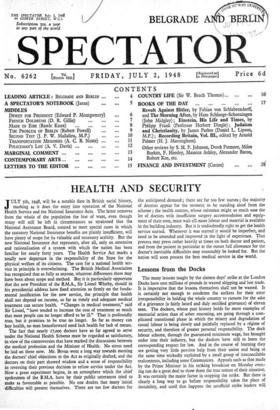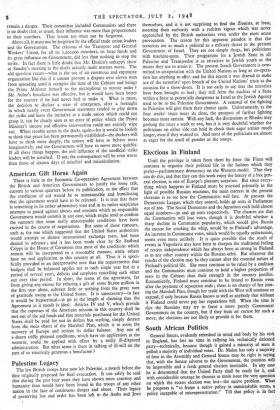Lessons from the Docks
The many lessons taught by the sixteen days' strike at the London Docks have cost millions of pounds in wasted shipping and lost trade. It is imperative that the lessons themselves shall not be wasted. It is certainly not enough to condemn the strikers for their utter irresponsibility in holding the whole country to ransom for the sake of a grievance (a fairly heard and duly rectified grievance) of eleven men. The dockers, whose past history holds far more examples of mercurial action than of sober reasoning, are going through a com- plicated transitional phase in which the misery and degradation of casual labour is being slowly and painfully replaced by a regime of security, and therefore of greater personal responsibility. The dock labour scheme, through the guaranteed minimum wage, has brought order into their industry, but the dockers have still to learn the corresponding respect for law. And in the course of learning they are getting very little positive help from their union and being at the same time wickedly exploited by a small group of irreconcilable malcontents, including some Communists. Appeals such as that made by the Prime Minister in his striking broadcast on Monday even- ing can do a great deal to show them the true nature of their situation. It was certainly the major factor in stopping the strike. But there is clearly a long way to go before responsibility takes the place of instability, and until that happens the unofficial strike leaders will
remain a danger. Their committee included Communists and there is no doubt that, as usual, their influence was more than proportionate to their numbers. That lesson too must not be forgotten.
Above all, it must not be forgotten by the official trade union leaders and the Government. The colossus of the Transport and General Workers' Union, for all its 1,200,000 members, its large funds and its great influence on Government, did less than nothing to stop the strike. In fact there is little doubt that Mr. Deakin's unhappy show at Sunday's meeting at the docks actually made matters worse. The old question recurs—what is the use of an enormous and expensive organisation like this if it cannot prevent a dispute over eleven men from spreading until it occupies the time of the Cabinet and brings the Prime Minister himself to the microphone to restore order ? Mr. Attlee's broadcast was effective, but it would have been better for the country if he had never had to make it. What is more, the decision to declare a state of emergency, after a fortnight in which nearly every Government statement tended to play down the strike and leave the initiative to a trade union which could not grasp it, can be clearly seen as an error of policy which the Prime Minister's sincere and effective intervention could not entirely wipe out. When trouble arises in the docks again—for it would be foolish to think that peace has been permanently established—the dockers will have to think more deeply, the unions will have to behave more imaginatively, and the Government will have to move more quickly. If all these things happen, the evil influence of the unofficial strike leaders will be scotched. If not, the consequences will be even worse than those of sixteen days of mischief and miscalculation.







































 Previous page
Previous page